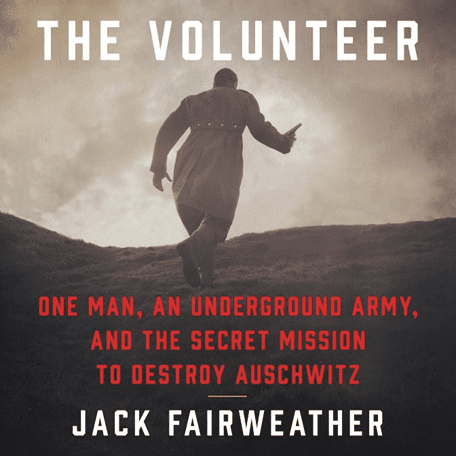
The Volunteer: One Man, an Underground Army, and the Secret Mission to Destroy Auschwitz
(For high school students, teachers, college students, and adults). As one review of Jack Fairweather’s book notes, this is the true story of Witold Pilecki’s unprecedented heroism.
In September 1940, he volunteered for a suicidal reconnaissance mission and allowed himself to be arrested by the Germans and sent to Auschwitz. There were informal reports of atrocities committed against the Polish prisoners there and the Polish Resistance wanted to investigate.
Pilecki kissed his beloved wife Zofia, and two young children, Maria and Andrzej, goodbye, walked into a German roundup of 2,000 civilians, and became Auschwitz inmate number 4859.
He established a military underground organization that gathered intelligence and prepared for an uprising. He also sent reports to his superiors in the underground Home Army (Armia Krajowa) about the camp’s killings, which the Germans first committed against Polish prisoners and later, began with the mass-gassing of Jews.
Pilecki hoped to conduct an armed uprising together with a Home Army guerrilla attack on the camp. However, at the time in 1943, this would have been suicidal. Even if the poorly-armed Home Army overpowered the small SS garrison in Auschwitz, it stood no chance against the much larger German military forces stationed nearby.
His reports were sent to the Polish government-in-exile in London, which provided them to the British, as well as to some Jewish organizations that tried to spread the word. However, no help materialized to stop the Germans’ mass murders in Auschwitz.
The British believed that winning the war took precedence over all else and the Polish proposal to bomb Auschwitz was considered a wasteful use of limited military resources.
By spring 1943, the Germans knew there was a Polish resistance network in Auschwitz and many members had been found out and executed. Fortunately, Pilecki’s identity as the ringleader hadn’t yet been discovered. On the night of Easter Sunday, he escaped, bringing with him incriminating documents that he had stolen from the Germans.
He later fought in the August 1944 Warsaw Uprising against the Germans, during which about 185,000 civilians and 15,000 insurgents died. After the fall of the uprising on 2 October, Pilecki was captured and taken prisoner by the Germans. He was sent to a prisoner-of-war camp for Polish officers in Bavaria, where he remained until the camp was liberated by the Americans on 29 April 1945.
In July 1945, Pilecki joined the military intelligence division of the Polish II Corps under Lieutenant General Władysław Anders in Ancona, Italy. By December 1945, he had arrived in Warsaw and begun organizing an intelligence gathering network. However, in July 1946 he was told that his identity had been uncovered by the Ministry of Public Security. Anders ordered him to leave Poland, but Pilecki was reluctant to comply because his wife and children were in the country.
Pilecki was arrested by the communist authorities on 8 May, 1947, and subjected to a show trial, in which he was sentenced to death on 15 May. On 25 May 1948, Pilecki was executed with a shot to the back of the head at the Mokotów Prison in Warsaw. He was 47 at the time and the location of where he was buried remains unknown.
Two criticisms of this work are applicable. As historian Marek Jan Chodakiewicz notes, “Fairweather fails to notice how the protagonist’s Christian faith is intermeshed with his Polish nationalism. Nationalism devoid of its Christian dimension tends to degenerate into neo-pagan nation worship. It is Catholic Christianity that endowed Pilecki with a powerful ‘moral compass’. And it was not nationalism that was chiefly responsible for the ethos of service.” Chodakiewicz points out further that Fairweather includes familiar anti-Christian and anti-Polish stereotypes, usually the standard accusations of “Polish anti-Semitism”, which are typically devoid of context and ignore anti-Polonism among Polish Jews.
